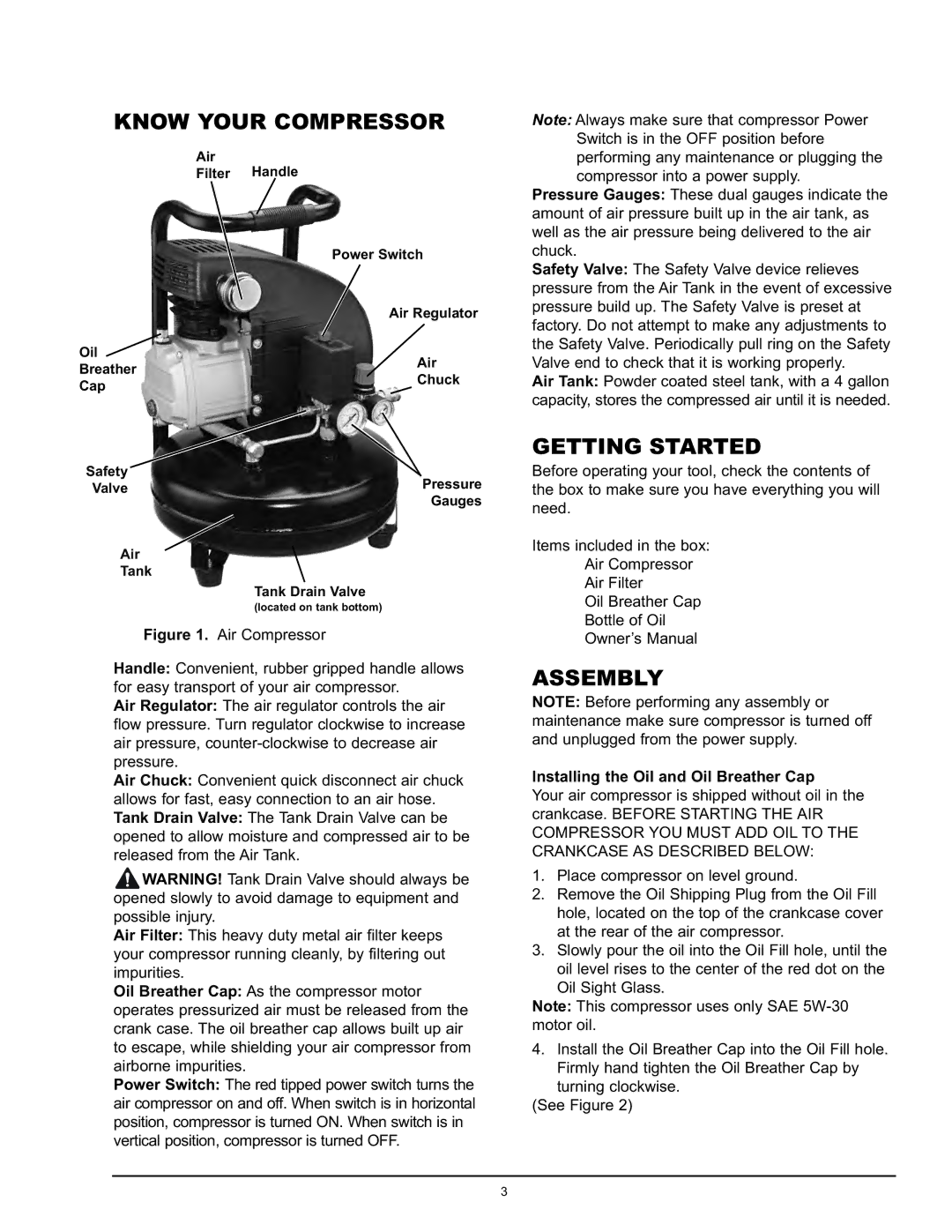
KNOW YOUR COMPRESSOR
Air | Handle | |
Filter | ||
| Power Switch | |
Oil | Air Regulator | |
Air | ||
Breather | ||
Cap | Chuck | |
Safety | Pressure | |
Valve | ||
| Gauges |
Tank Drain Valve (located on tank bottom)
Figure 1. Air Compressor
Handle: Convenient, rubber gripped handle allows for easy transport of your air compressor.
Air Regulator: The air regulator controls the air flow pressure. Turn regulator clockwise to increase air pressure, counter-clockwise to decrease air pressure.
Air Chuck: Convenient quick disconnect air chuck allows for fast, easy connection to an air hose. Tank Drain Valve: The Tank Drain Valve can be opened to allow moisture and compressed air to be released from the Air Tank.
WARNING! Tank Drain Valve should always be opened slowly to avoid damage to equipment and possible injury.
Air Filter: This heavy duty metal air filter keeps your compressor running cleanly, by filtering out impurities.
Oil Breather Cap: As the compressor motor operates pressurized air must be released from the crank case. The oil breather cap allows built up air to escape, while shielding your air compressor from airborne impurities.
Power Switch: The red tipped power switch turns the air compressor on and off. When switch is in horizontal position, compressor is turned ON. When switch is in vertical position, compressor is turned OFF.
Note: Always make sure that compressor Power
Switch is in the OFF position before performing any maintenance or plugging the compressor into a power supply.
Pressure Gauges: These dual gauges indicate the amount of air pressure built up in the air tank, as well as the air pressure being delivered to the air chuck.
Safety Valve: The Safety Valve device relieves pressure from the Air Tank in the event of excessive pressure build up. The Safety Valve is preset at factory. Do not attempt to make any adjustments to the Safety Valve. Periodically pull ring on the Safety Valve end to check that it is working properly.
Air Tank: Powder coated steel tank, with a 4 gallon capacity, stores the compressed air until it is needed.
GETTING STARTED
Before operating your tool, check the contents of the box to make sure you have everything you will need.
Items included in the box:
Air Compressor
Air Filter
Oil Breather Cap
Bottle of Oil
Owner’s Manual
ASSEMBLY
NOTE: Before performing any assembly or maintenance make sure compressor is turned off and unplugged from the power supply.
Installing the Oil and Oil Breather Cap
Your air compressor is shipped without oil in the crankcase. BEFORE STARTING THE AIR COMPRESSOR YOU MUST ADD OIL TO THE CRANKCASE AS DESCRIBED BELOW:
1. Place compressor on level ground.
2. Remove the Oil Shipping Plug from the Oil Fill hole, located on the top of the crankcase cover at the rear of the air compressor.
3. Slowly pour the oil into the Oil Fill hole, until the oil level rises to the center of the red dot on the Oil Sight Glass.
Note: This compressor uses only SAE
4. Install the Oil Breather Cap into the Oil Fill hole. Firmly hand tighten the Oil Breather Cap by turning clockwise.
(See Figure 2)
3
